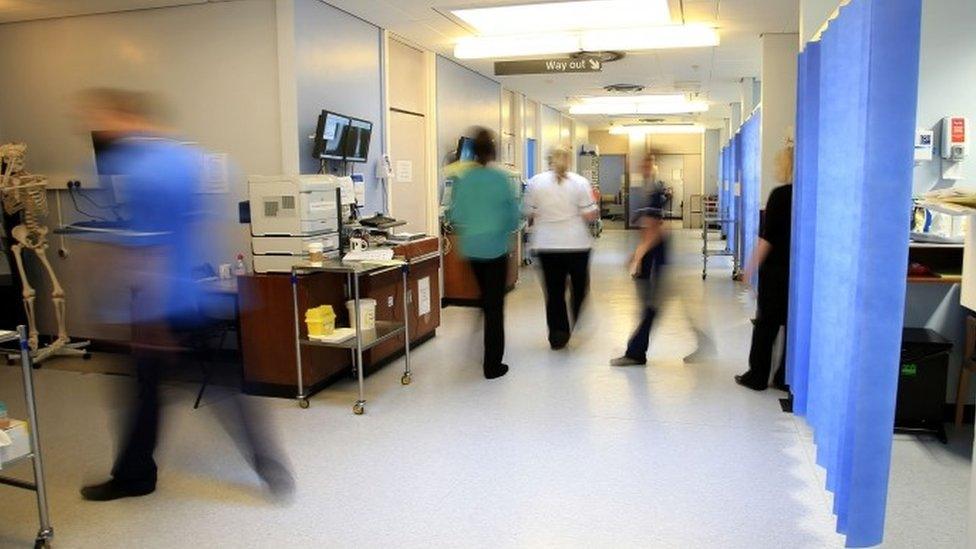Hospital noise levels growing worse, say researchers
- Published
- comments

Noise levels in hospitals are getting worse, research suggests.
Anyone who has ever stayed overnight in a hospital will know how difficult it can be to sleep, surrounded by staff, machinery, trolleys and telephones.
In the UK, 40% of hospital patients are bothered by noise at night, according to in-patient surveys.
But it's not only the patients' wellbeing that may be affected - high noise levels can also have an impact on staff performance and burnout rates.
Researchers from King's College London say noise levels in intensive care - where the most vulnerable patients are looked after - regularly exceed 100 decibels.
That's the equivalent of loud music being played through headphones.
And it's not just the frustration of being unable to hear each other speak or the fatigue and irritation sparked by poor sleep that are causing concern.
At that level, noise pollution has been implicated in the development of a condition known as intensive care psychosis - a form of delirium where patients experience anxiety, become paranoid, hear voices and see things that are not there.
London deaths linked to noise pollution
Hospital wards 'far too noisy', external
Increased stress, greater pain sensitivity, high blood pressure, and poor mental health are also possible side-effects.
It means patients often decide to leave hospital before they are completely better - only to be re-admitted at a later stage.
Coronary care patients treated during noisy periods were found to have a higher incidence of rehospitalisation, compared with those treated during quieter periods.
"People leave early, and long after discharge the trauma remains. It puts patients off coming back," Dr Andreas Xyrichis, lead author of the report, told the BBC.
For staff, a noisy working environment is unavoidable - but the consequent stress can affect their performance, while the difficulties of hearing each other and patients speak can compromise the quality and safety of healthcare.

Researchers say progress in combating noise pollution in hospitals has been "unacceptably slow-moving".
So far, they say, attempts to reduce noise have been piecemeal and idiosyncratic.
Researchers are calling for a more co-ordinated approach - and solutions that actively involve patients.
The team, from King's and the University of the Arts London (UAL), believe three key areas must be addressed:
The hospital soundscape must be considered as a whole - not just the noisiest elements, such as hospital machinery and alarms, but also low but intrusive sounds, such as the noise of keys in locks and squeaky doors
Patients' perception and response to a variety of common hospital sounds should be more thoroughly researched. Researchers were surprised to learn some sounds, such as the tea trolley, brought a degree of comfort to patients - as a signal of social interaction
Patients and families need clear information about probably noise levels during admissions, so they are better prepared in advance, and can consider simple solutions such as bringing their own headphones or earplugs
Dr Xyrichis questions whether sound "is considered" when creating or redeveloping hospital infrastructure.
But he stresses that modifications can be made to existing environments at a relatively low cost.
Interventions such as sound-absorbing panels and noise-warning systems "have provided some benefit".
Elsewhere, small trials have shown that sound-masking - the use of background sound (such as white noise) in particular environments to reduce noise-induced disturbance - can significantly improve sleep.
Most importantly, says Dr Xyrichis, research should "be more aware of the patients".
He says research made clear that much of patients' agitation over noise was often caused by "not knowing what the noises were".
"It can be very frightening in hospital. We need to do more work with patients to find out about what kinds of noises stress them out."